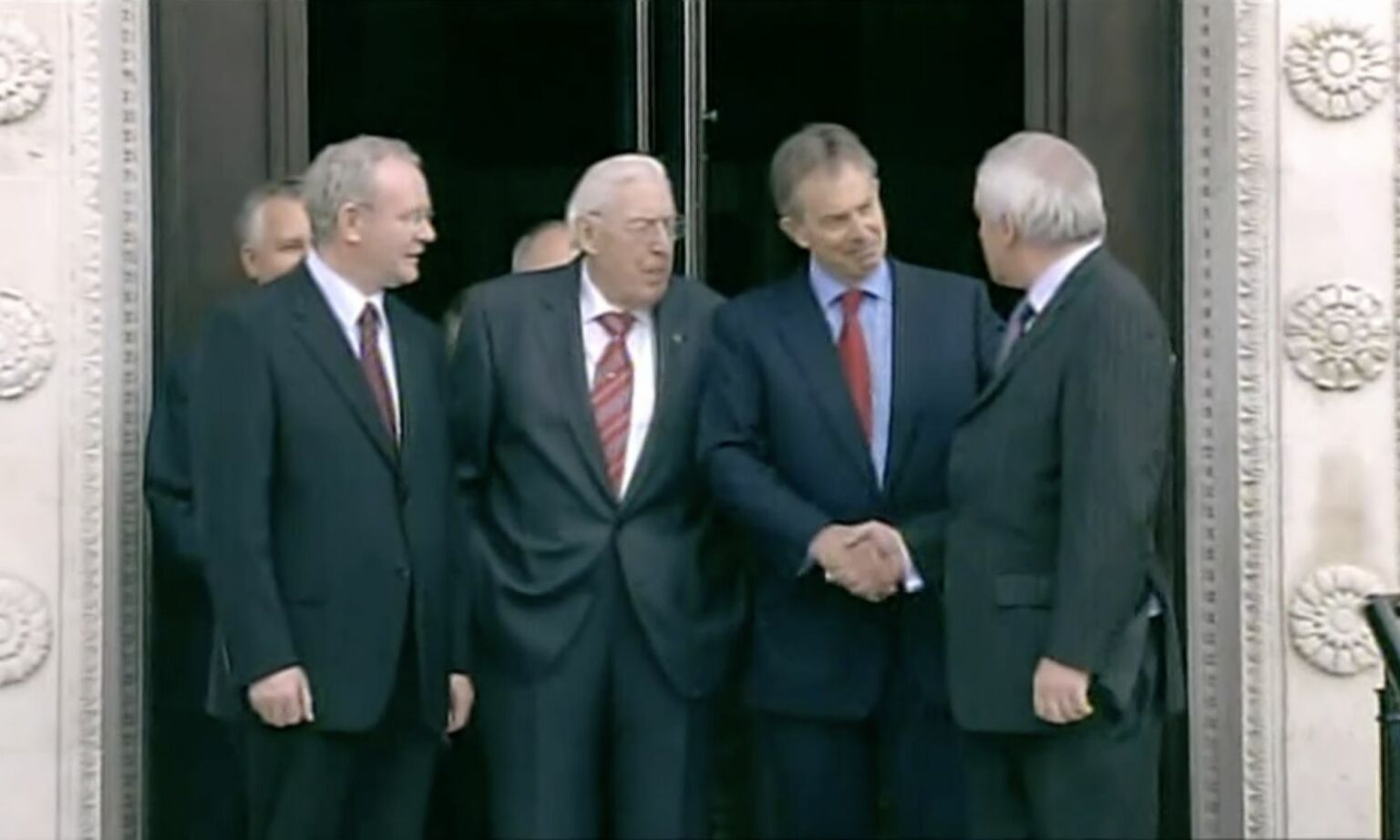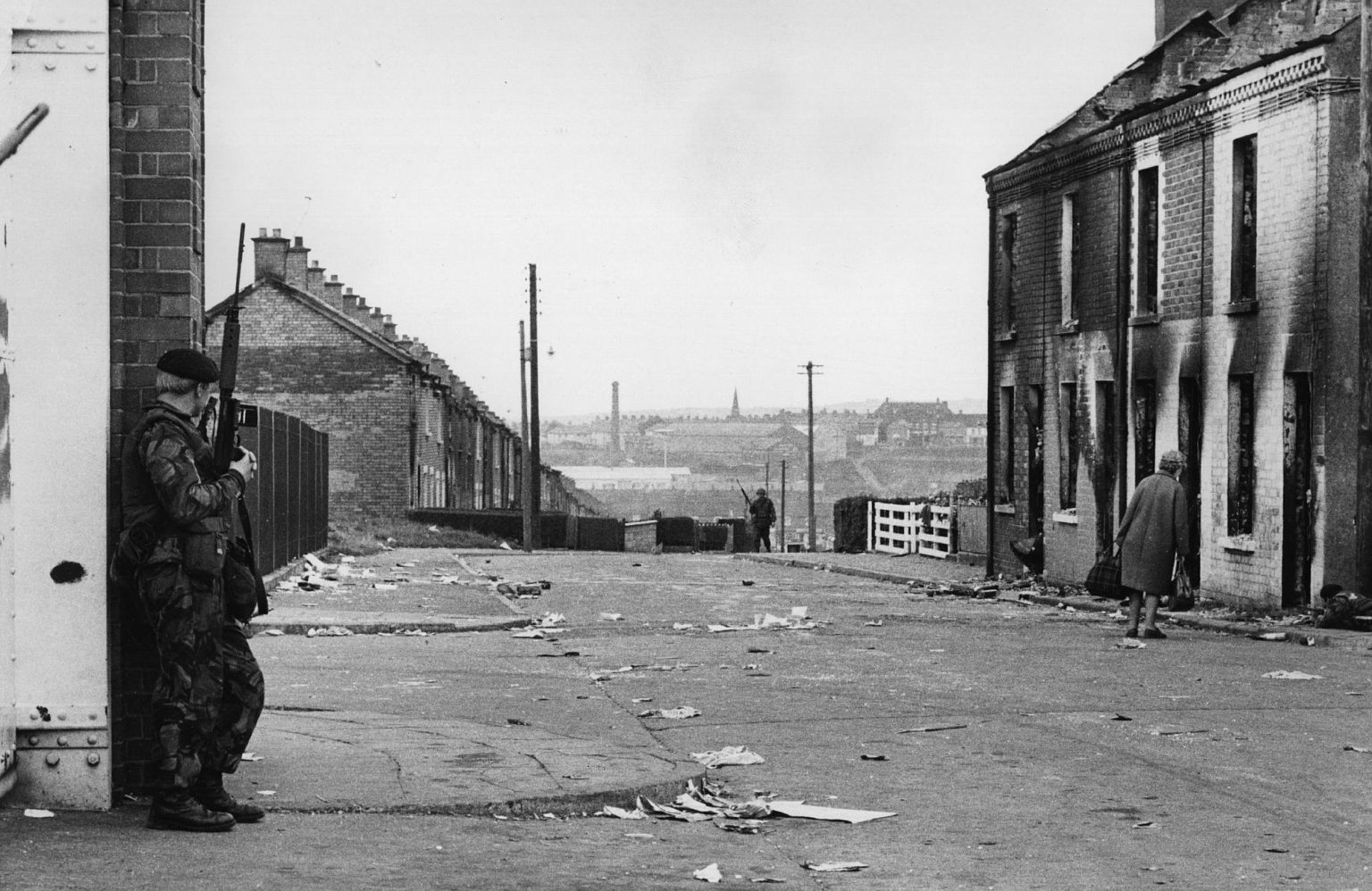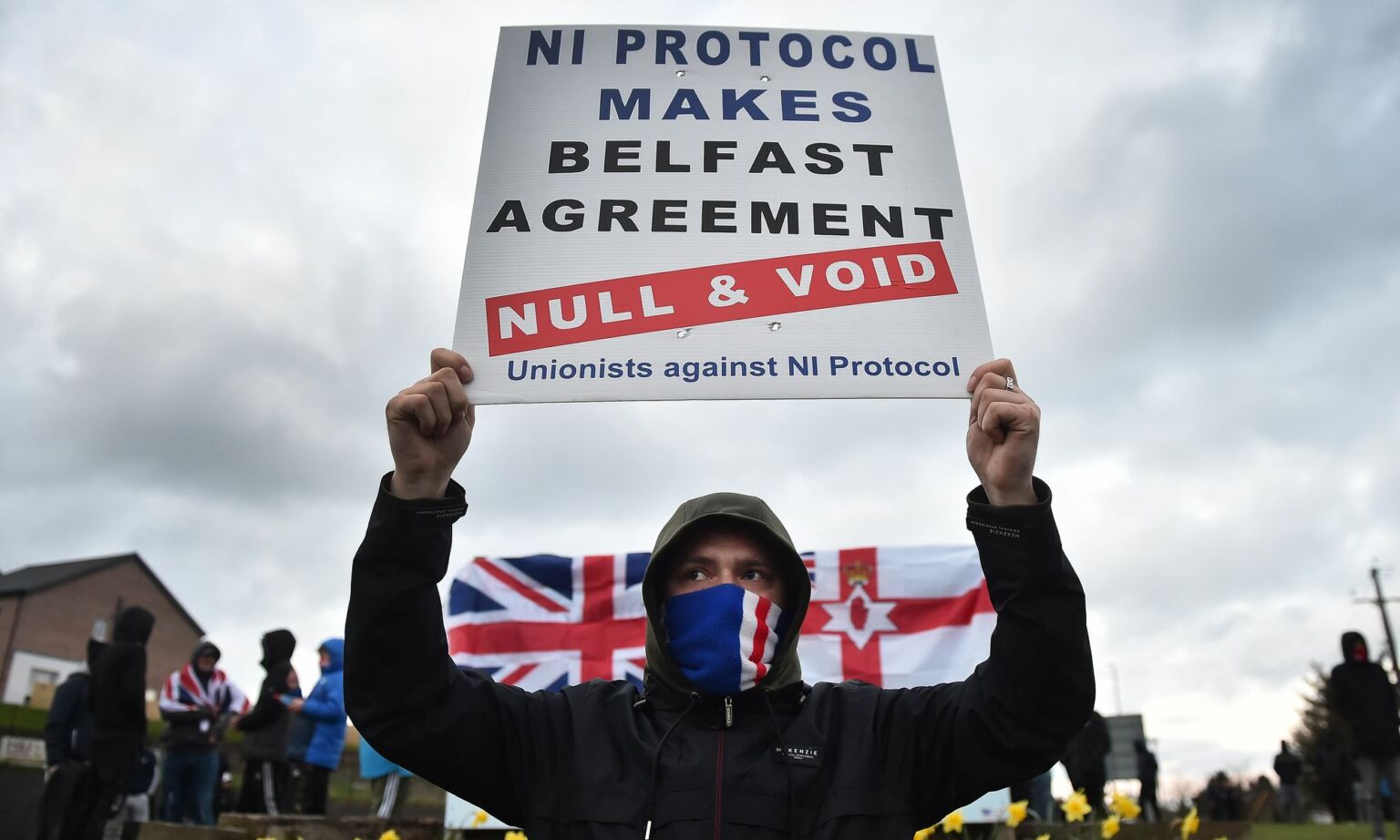
Long-read
The curse of the Good Friday Agreement
That treaty was bad for Britain, bad for Ireland and bad for democracy.
Want to read spiked ad-free? Become a spiked supporter.
It has become heresy of late to say or do anything that might jeopardise the Good Friday Agreement. Push for a ‘Hard Brexit’ – that is, the removal of the entire UK, including Northern Ireland, from the European Union – and you’ll be accused of showing contempt for this treaty that ended the Troubles. Brexiteers display a ‘casual disdain’ for the GFA, the ‘fragile accord that ended a bloody war’, says a writer for the Guardian.
CNN warns that the ‘disorder’ of late 20th-century Northern Ireland might return if Brexit Britain scuppers any part of the GFA. We might see the end of ‘the fragile peace that binds together the region’s diverse community’, apparently. (Why is peace in Ireland always ‘fragile’? Someone needs to remind these writers that the Troubles have now been over for longer than they lasted.)
Politicians of all stripes worship the GFA like a holy tract. Prime minister Rishi Sunak is organising a huge celebration for the 25th anniversary of the signing of the GFA – on Monday 10 April – which we can expect to be a borderline religious affair. President Biden, no less, will attend, to celebrate the ‘tremendous progress’ delivered to Ireland by this blessed agreement.
It is held up as an almost magical treaty – it’s a ‘beacon of hope for the world’, said Nancy Pelosi last year – and anyone whose behaviour in any way undermines it is damned as a political blasphemer who threatens to bring war to Ireland once more. In removing a part of the island of Ireland from the EU, while the rest of Ireland will remain a member state, Brexit is currently looked upon as the gravest menace to the ‘remarkable achievements’ of the GFA.
This ringfencing of the Good Friday Agreement from critical debate, the placing of a treaty beyond the reaches of earthly dissent, is a serious problem. It blinds us to the agreement’s faults, which are legion. It is designed to. The sanctification of the agreement serves as a warning to mortals to suspend their critical faculties and to treat this document largely drawn up by Tony Blair – not normally a politician whose word we’re expected to treat as gospel – as unimpeachably good.
But it isn’t true. It might be a sin to say it, but the GFA is a cruel, unjust treaty that damns Northern Ireland to an undesirable status unique among the civilised nations of the world. Namely, communalist technocracy; state-managed sectarianism; a kind of post-sovereign limbo in which no one really rules, and no one wants to. The impact of the Good Friday Agreement on the democratic integrity of both Britain and Ireland has been incredibly corrosive. Celebrate? We should think about democratic repeal.
The Good Friday Agreement – officially the Belfast Agreement – turns 25 today. It is the treaty that brought to an end the most recent war between British forces and Irish forces: the so-called Troubles of 1969 to 1994.
That was a conflict between the British army and its local allies, most notably the Royal Ulster Constabulary (RUC), which were devoted to keeping Northern Ireland as part of the United Kingdom, and the Provisional Irish Republican Army (IRA) and some smaller guerrilla armies, which were committed to expelling British forces from Ireland and restoring the 32-county republic that was fleetingly proclaimed in the Easter Rising in Dublin in 1916. Around 3,700 people died in this modern war. Close to 50,000 were injured. The IRA declared a ceasefire in 1994, though it broke it with its huge bombing of South Quay near Canary Wharf in 1996.
The ceasefire was restored and the end of the war was formalised through the Good Friday Agreement. The agreement provided for the disarming of the IRA and the removal of huge numbers of British troops from Northern Ireland; the overhaul of the RUC, which was widely distrusted by the nationalist community; the release of prisoners whose sentences were linked to acts of war carried out in the Troubles; and the creation of a new system of devolved government in Northern Ireland, most notably in the shape of the Northern Ireland Assembly.
The agreement has a very high level of democratic legitimacy. It was put to a referendum in both Northern Ireland and the Republic of Ireland, where 71.1 per cent and 94.4 per cent of voters, respectively, said yes to it. It was signed on 10 April 1998 by then British PM Tony Blair and then Irish Taoiseach Bertie Ahern. It was a ‘remarkable achievement’ that ‘brought to an end 30 years of conflict’, says the current government.
That the people of Ireland, in both the south and the north, enthusiastically voted through a treaty that officially ended the Troubles is not at all surprising. This was a horrendous and exhausting conflict. Experts calculate that between 1969, when British troops were sent to Northern Ireland to assist in the suppression of the Catholic uprising for civil rights, and 1998, when the GFA was signed, there were 36,923 shootings and 16,209 bombings. The young were the worst affected: 1,533 of the people who died in the Troubles were under the age of 25. Fifty-four per cent of deaths were among civilians. No one can criticise the people of Ireland for overwhelmingly supporting a treaty that ended the bloodshed. But the question remains: was the GFA a ‘remarkable achievement’? Were there costs attached to the treaty?

In recent years, especially since the vote for Brexit, the Good Friday Agreement has taken on wildly different meanings. Those of a Remain persuasion worship it as a peace treaty. A miraculous peace treaty which no one may question. Those of a Leave bent, meanwhile, irritated by the political establishment’s weaponisation of the GFA against the removal of all of the UK from the EU, sometimes dismiss the agreement as a light document – a measly 30 pages long – that actually doesn’t say very much about avoiding a ‘hard border’ on the island of Ireland. That’s true. Even the BBC was forced to admit that the GFA contains a ‘lot less than you might think’ on the issue of a fortified border in Ireland.
Yet the fact is the Good Friday Agreement signified a profound constitutional overhaul for both the United Kingdom and the Republic of Ireland. The constitutions of both nations were changed dramatically by this treaty. Both nations made historic compromises that have had the long-term effect of weakening their sovereign integrity and diluting their democratic coherence.
The consequences of these compromises are still felt today, most notably in the agreement’s subtle limiting of what the ostensibly independent nations of Britain and Ireland may and may not do within their own borders. The consensual enfeeblement of sovereignty brought about by the Good Friday Agreement is most keenly felt in the limbo land of post-GFA Northern Ireland, which now exists in a kind of post-sovereign purgatory, but it has had severe ramifications for Britain and Ireland, too.
It is a little discussed fact that the GFA required both the UK and Ireland to all but relinquish their sovereign claims over Northern Ireland. The price the UK paid for ending the Troubles and bringing its troops back to their bases in mainland Britain was the public renunciation of any serious or long-term desire to govern Northern Ireland. Some will consider this a price worth paying – 1,441 British military personnel were killed in the Troubles, a death rate that would exact a high moral toll on any modern nation. But the consequences of the UK’s dilution of its own sovereignty through the mechanism of the Good Friday Agreement still ought to be rationally weighed up.
The GFA did something extraordinary: it turned the UK from the sovereign power in Northern Ireland to the mere caretaker of Northern Ireland. The GFA expressly binds every UK government to ‘rigorous impartiality’ in relation to Northern Ireland. Where Margaret Thatcher famously declared that Northern Ireland was as British as Finchley, the GFA said it was up to the people of Northern Ireland alone to decide ‘whether they prefer to continue to support the Union with Great Britain or a sovereign united Ireland’. ‘We don’t really care’, the British government essentially said. Our ‘jurisdiction there’ shall be ‘exercised with rigorous impartiality’, as the agreement decreed.
This was a public and binding declaration of a fundamental lack of interest in exercising meaningful sovereign authority in Northern Ireland. This insouciant attitude towards sovereignty in one corner of the kingdom had been a long time coming. During the secret talks between British government officials and representatives of the IRA in the early 1990s, which led to the Downing Street Declaration of 1993, the officials made it clear they were tiring of exercising jurisdiction in Northern Ireland. This gave rise to one of the most striking statements made by a British minister in modern times.
It was Peter Brooke, the secretary of state for Northern Ireland under Margaret Thatcher and then John Major. In 1990, he gave a speech in which he declared that the UK had no ‘selfish strategic or economic interest’ in Northern Ireland. These remarkable words were repeated in the Downing Street Declaration, no doubt to signify to the leaders of the IRA involved in the talks that the UK was serious about wanting a way out of war.
‘No selfish strategic or economic interest’… The government would not say that about any other part of the nation. It wouldn’t say it about Birmingham or Devon. No country would make such a declaration about a part of its own territory. Imagine if Emmanuel Macron were to wake up tomorrow and say his government had no selfish strategic or economic interest in governing Lyon. Officialdom’s relinquishing of its interest in Northern Ireland was an open declaration of its moral exhaustion following 25 years of war. It was a subtle act of self-annexation to appease the opposing army. And it was institutionalised in international law via the commitment to ‘rigorous impartiality’ spelt out in the Good Friday Agreement.
For years, there were few, if any, consequences to Britain’s post-war diminishment of its sovereignty. But that changed following the EU referendum in 2016. Then, the British elites’ institutionalised nonchalance towards their own rights of sovereign jurisdiction came back to bite them – hard. It was not lost on the powerful opponents of Brexit – Brussels, Washington, the Irish government and sections of our own elite – that the UK had very recently declared before the whole world its non-committal attitude towards its own territorial integrity. The Good Friday Agreement’s declaration that Northern Ireland could end up as British or Irish – who knows? – was ruthlessly weaponised by the technocratic elites who sought to weaken the new global power of Brexit Britain by siphoning off a part of its territory for Brussels. The part that it said it doesn’t have much interest in.
As one perceptive commentator argued, Brexit made Northern Ireland ‘strategically significant’ again. ‘Brexit makes Northern Ireland of strategic and economic interest to Ireland, Britain and the EU’, observed Professor Colin Harvey of Queen’s University Belfast. But the UK had already stated, in an international treaty, that it has no real commitment to Northern Ireland.
It thus looks to many, said Harvey, that ‘the EU has shown more genuine concern about the fate of Northern Ireland than the Westminster government’. The ‘selfish and strategic imperative’ for Northern Ireland now is to have a ‘special arrangement’ that brings it closer to Ireland and the EU – who are ‘interested’ in it – rather than the UK, said Harvey. And how could the UK argue against this? It is rigorously impartial, after all. It has no strategic love for Northern Ireland, as we know. If the UK does try to reassert sovereign interest in Northern Ireland, it will stand accused of abandoning ‘the principles and values that informed and underpinned the peace process’ and of ‘retreat[ing] to the language of the 1980s’, says Harvey. That is, to the pre-GFA language of sovereignty, of a commitment to governing all of the kingdom’s territory.

This is what the disavowal of sovereignty does to a nation: it weakens its territorial integrity and emboldens its opportunistic enemies. The real reason the EU and its noisy allies in the British elite worship the Good Friday Agreement is because they recognise that its legal codification of Britain’s lack of strategic interest in Northern Ireland creates the space for the exercise of the EU’s strategic interest in Northern Ireland. Which is to keep it within the Single Market both as a means of maintaining the market’s strength and compounding Brexit Britain’s territorial disarray.
So the EU elites’ profoundly cynical accusation that any attempt by Brexit Britain to reassert dominion in Northern Ireland is an affront to the Good Friday Agreement and to peace itself makes perverted sense. For didn’t the UK itself explicitly link peace in Ireland to sovereign dilution in the UK, where Ireland would be delivered from war precisely by the UK’s repudiation of strategic interest in the Six Counties?
Michael Collins famously said he had signed his own death warrant when he put his name to the Anglo-Irish Treaty of 1921 that partitioned Ireland. It seems possible the United Kingdom did likewise when it signed the Belfast Agreement of 1998 that made British indifference to sovereignty central to the creation of a New Ireland. The EU and its allies in the globalist elites, from Washington to London, certainly think so. ‘Warmongers’, they will cry every time the UK wonders if it might, after all, have a strategic and economic interest in maintaining authority over all its land.
There is another important way in which the GFA incapacitated British sovereignty. The agreement required both the UK and the Republic of Ireland to incorporate the European Convention of Human Rights into national law. This is why Blair brought in the Human Rights Act (1998) swiftly after the signing of the GFA. The passing of that act heralded a new era in British politics, one in which public policy can be shaped as much by the deliberations of the judiciary as by the will of the people.
Here, too, we can see that the GFA’s impact on the entire constitutional make-up of the UK was enormous, and, again, troublesome. In the words of KD Ewing, professor of public law at King’s College London, the passing of the HRA represented an extraordinary ‘redistribution of political power in this country’. Its empowerment of judges to argue that a democratically passed statute might run counter to the rights guaranteed by the European Convention, and thus might be considered illegitimate, risked countering the 1688 Bill of Rights itself, said Ewing. That bill ‘proclaimed loudly’ that ‘proceedings in parliament ought not to be questioned or impeached in any court or any other place’. And yet now, with convention-emboldened judges, they could be. We have crossed the ‘constitutional Rubicon’, said one peer on the passing of the HRA.
And what do the elites say to those who propose repealing the HRA in order that we might restore the sovereignty of parliament in the realm of law-making? That we are undermining the Good Friday Agreement, of course. When, in 2015, then PM David Cameron posited replacing the HRA with a Bill of Rights that would secure both individual liberty and parliamentary sovereignty, he was told he was in ‘breach [of] the Good Friday Agreement’.
When the Conservatives said in their manifesto in 2016 that they would withdraw from the European Convention on Human Rights, the government of Ireland directly intervened and expressed ‘serious concern’. Liz Truss, then justice secretary, said there would ‘absolutely’ be a new British Bill of Rights. But a foreign-affairs spokesman from Ireland said it was unconscionable that the UK would ‘unilaterally’ repeal ‘a key piece of legislation backing up the Good Friday Agreement’. ‘The Irish government is a co-guarantor of the Good Friday Agreement and at the very least there needs to be a proper consultation by the British if they are going to repeal legislation that underpins the agreement’, he said.
Again, we see what a technocratic albatross around the neck of sovereign Britain the GFA has been. Not only has it emboldened the EU to claim a strategic interest in Britain’s morally abandoned territory of Northern Ireland. It also permits the Irish government, no doubt with the support of its imperial backers in Brussels and Washington, to reprimand British officials for even thinking about repealing legislation and restoring parliamentary authority in Britain itself. The GFA’s reorganisation of the British constitution to signal to the IRA that things had changed has ended up weakening Britain’s sovereign control over its own territory and laws.
It isn’t only the UK whose constitution was wounded by the GFA. So was Ireland’s. The republic’s key compromise was its rewriting of Articles 2 and 3 of the Constitution of Ireland, which was adopted in 1937. These were the articles through which Ireland staked its sovereign claim to Northern Ireland. Article 2 was key. ‘The national territory consists of the whole island of Ireland, its islands and the territorial seas’, it plainly stated. That is, Dublin was the legitimate government of the Six Counties, whatever Britain might say to the contrary.
Articles 2 and 3 were controversial, of course. This is why the Queen did not set foot in the Republic of Ireland until 2011 – heads of state do not tend to visit nations that make irredentist claims to parts of their territory. But they were also central to Ireland’s historic sense of self and to its aspiration to future national unity.
The GFA’s dilution of Articles 2 and 3 – the new versions talk vaguely about the right of everyone on the island of Ireland to feel ‘part of the Irish Nation’ – represented a weakening of Irish sovereignty too, a disconnection of contemporary Ireland from the historic circumstances of its birth. That is, from the proclamation of a 32-county republic made at the General Post Office in Dublin in Easter 1916. Little wonder that David Trimble, then leader of the Ulster Unionist Party, could crow that Dublin’s ‘illegal territorial claim to Northern Ireland… has been removed and the South now accepts the legitimacy of Northern Ireland’.

Then there are the consequences for Northern Ireland of this joint eschewment of sovereign interest, of both Britain and Ireland’s post-Troubles adoption of historical disinterest in governing that territory. The result has been political limbo, a statelet frozen in historical aspic between neighbouring lands that don’t really want to govern it. Neither British nor Irish. Neither fully in the United Kingdom nor in the Republic of Ireland. A half-nation adrift in a purgatory of withdrawn sovereignty.
Who rules Northern Ireland? No one really knows. The NI Assembly is meant to, but it spends more time suspended by crisis than sitting in government. Indeed, the hollow, ineffective assembly is yet further proof of the post-sovereign disarray unleashed by the Good Friday Agreement. Far from challenging the sectarian divisions that have rocked Northern Ireland for so long, the assembly codifies them. The GFA stipulated that everyone elected to the devolved entity of the NI Assembly should make a declaration of their communal allegiance, whether that be ‘Unionist’, ‘nationalist’ or ‘other’. This tying of democratic representation to tribal signifiers represented the ‘institutionalisation of sectarianism’, argued Stephen Farry and Sean Neeson of the Alliance Party in 1998.
Yes, back in 1998 there was actually criticism of aspects of the GFA. Hard to imagine now, when it has attained Biblical levels of devotion. The organisation of the assembly according to communalist balance as well as democratic representation made this a system of ‘tribal dualism’, argued Farry and Neeson, in which elections would be ‘little more than tribal head-counts’. Thus was the space for new political thinking and new forms of political representation diminished, as all have been encouraged to stay in their sectarian lane. That’s what the assembly rewards, with its complicated systems of clout based on ethnic as well as electoral ideals.
This might explain why Northern Ireland remains a deeply divided society. This is the dirty secret of the era of the Good Friday Agreement – it has preserved rather than resolved communal tensions. In 2003, the Irish Times reported that while walls had come down in Europe – following the fall of the Berlin Wall in 1989 – in Northern Ireland they had gone up. The number of terribly named ‘peace walls’ that separate Catholics and Protestants had risen from 15 in 1994 to 37 in 2003. In 2020, there were 116 – all of them unsightly ‘visible symbols of community segregation and division’. Peace in Ireland? More like ‘peace barriers’ in Ireland.
The ‘peace walls’ speak to the terrible limbo of modern Ireland. Through the GFA, Northern Ireland became nobody’s country. Britain had little strategic interest, Ireland abandoned its territorial claim. The people of Northern Ireland could be either British or Irish, depending on how they felt. And the new institutions, especially the assembly, were devoted more to managing the divided populace than to exercising real, life-changing sovereignty in people’s lives. Thus was Northern Ireland turned from a part of a sovereign nation into a greyzone of post-government, and thus were the people there reduced from citizens to communalist creatures to be half-represented (by the sectarian assembly) or stroked (by therapeutic NGOs) or managed (by the post-war police force). To see what nightmares can flow from technocracy, look no further than Northern Ireland.
No one, aside from a handful of bitter republicans in extremist groups like the Real IRA, wants to go back to war. However, the decomposition of both British and Irish sovereign interest in Northern Ireland, the abandonment of that territory to the anti-democratic machinations of population management and the policing of ‘peace’, does speak to a moral decay. It was awful when people fought over who should govern Northern Ireland. But it is also bad that no one thinks Northern Ireland is worth fighting for anymore. Except the EU. It is watching, always.
Brendan O’Neill is spiked’s chief political writer and host of the spiked podcast, The Brendan O’Neill Show. Subscribe to the podcast here. And find Brendan on Instagram: @burntoakboy
Main Picture by: BBC.
Pictures one and two by: Getty
Picture three by: by NornIronPhotos, published under a creative commons license.
Who funds spiked? You do
We are funded by you. And in this era of cancel culture and advertiser boycotts, we rely on your donations more than ever. Seventy per cent of our revenue comes from our readers’ donations – the vast majority giving just £5 per month. If you make a regular donation – of £5 a month or £50 a year – you can become a and enjoy:
–Ad-free reading
–Exclusive events
–Access to our comments section
It’s the best way to keep spiked going – and growing. Thank you!







Comments
Want to join the conversation?
Only spiked supporters and patrons, who donate regularly to us, can comment on our articles.